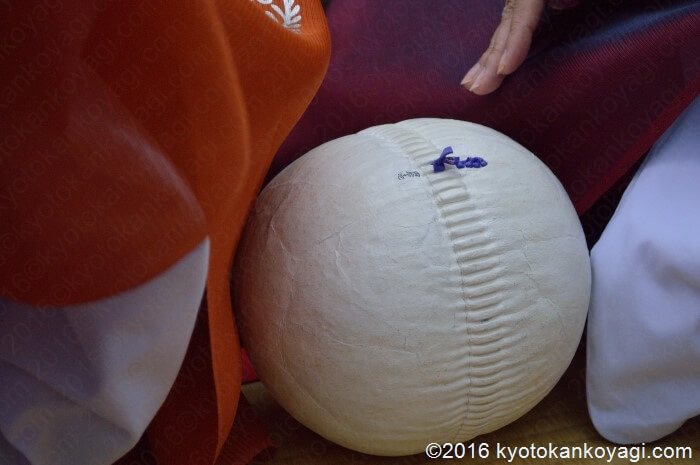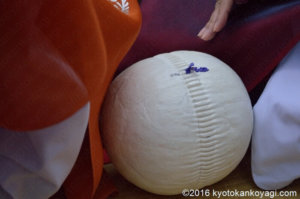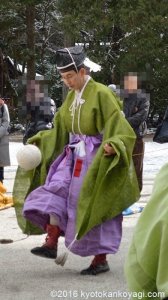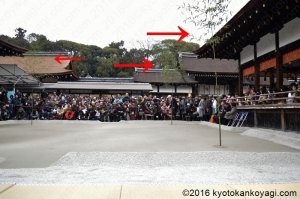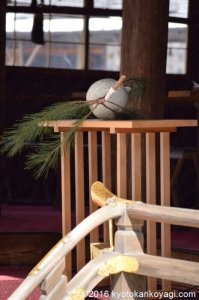Kemari Hajime at Shimogamo shrine
On 4th Janurary, around 1:30 p.m., Kemari dedication takes place at Shimogamo shrine. Kemari is a traditional Japanese foot ball game which has 1400 years of history. Let us learn what Kemari is on video and text: its history, how to play it, and so on.
A short history of Kemari
Did Japnan give birth to Kemari?
Today, many people believe that Kemari is a traditional sports indigenous to Japan. The truth is that Kemari was born in ancient China. It was brought to Japan with the introduction of Buddhism in the 7th century. Since then, people loved to play it without regardless of classes they belonged.
In Heian period, it was popular sports among court nobles. It is described in The Pillow Book, a famous essay written by Musasaki Shikibu. “Kemari is not refined, but amazing sports to play”, she was quoted as writing.
In the Muromachi period (1336 – 1573), Kemari was considered as an essential sports for Samurai worriors. For example, the Ashikaga Shogunate was very fond of it. Ashikaga Yoshimitsu (the founder of Kinkakuji temple) and Yoshimasa (the founder of Ginkakuji temple) are well known as Kemari-enthusiasts.
Kemari gave rise to revolutions
When Kemari was introduced, the Soga clan, the most prosperous clan at that time, exercised huge political power. The imperial court was a puppet regime and Soga No Umako, the most successful man in the clan, even assassinated the emperor.
One day, Nakano Oh Eno Ohji, a prince of the emperor Jomei, played Kemari and his shoe came off. Then, Nakatomi No Kamatari found and handed it to the owner. Kamatari was a distinguished states man. This encounter lead consecutive revolutions: The emperor and the Imperial family seized power as the ruler of Japan again.
How do we play Kemari?
The rules
Kemari ball
The word “Keamri” means “a ball to be kicked.” Two hemisphere made of deerskin are put together with a belt made of horse skin. A player let me have it. It was as light as balloon.
Kemari uniform
The green garment is Marizuikan and purple trousers are called Maribakama. The black hat is called Eboshi.
Kemari court
The court is called Mariba and about 50 feet in length and width. Each corner has a tree named Shikigi. Traditionally, they are different trees: Cherry blossom, maple, pine, and willow trees. In the photo, there are four bamboos.
Pray for a game
Keamri zome is a dedication to the Deity of Shimogamo shrine. Mari was put on a branch of pine tree and priest purifies the ball. After that, a player bring the ball and removes the branch.
How to play Kemari?
Kemari is usually played by 6 or 8 players.(In the video, 8 players). Kemari is not a game of win or lose. The aim of it is passing a ball to each other. Players kick mari wihtout bending their knees and showing sole of their foot because these deeds are considered rough.
Players shout out “Ari,” “Yah”, and “Oh”. These are names of the Deities of Kemari who descend to Shikigi.
Kemari doesn’t have match time. It is finished when a chief player think a game is matured.
Kemari video
Now we are ready to enjoy Kemari game. Enjoy the video!
How to get to Shimogamo shrine?
- About 10 minutes walk from Demachi Yanagi Eki mae bus stop: Bus no. 17, 102, and 203.
- About 5 minutes walk from Keihan/Eiden Demachi Yanagi station.
About Shimogamo shrine
- Address: 59 Shimogamo Izumigawacho, Sakyo Ward, Kyoto 〒606-0807
- Phone: 075-781-0010
- Mail: [email protected]
- Entrance fee; Free
- Opening hours 6:30-17:00
- Website: Shimogamo shrine official (In English)

